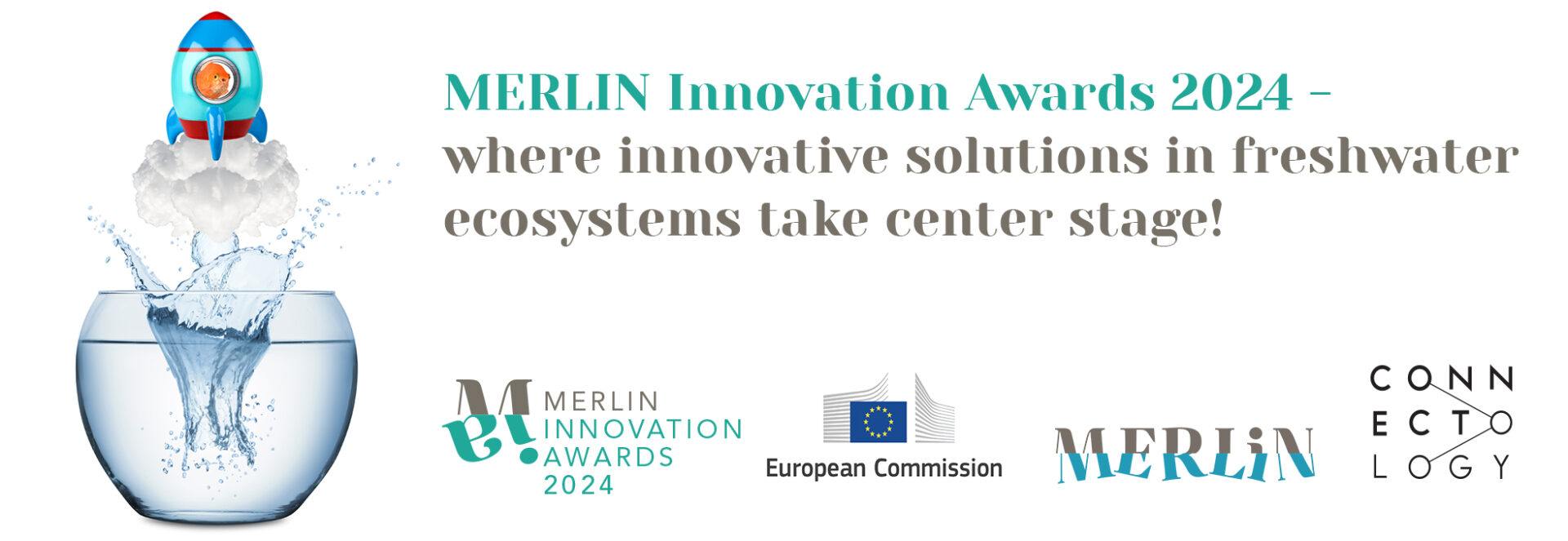
MERLIN Innovation Awards celebrates state-of-the-art approaches to freshwater restoration at 2024 ceremony
The winners of the annual MERLIN Innovation Awards – which highlight cutting-edge solutions for freshwater restoration – were announced earlier this month. Entries from organisations across the world were assessed by an expert panel, and shortlists for the two categories – Service of the Year and Product of the Year – were compiled. Two winners were announced at a busy online ceremony on February 8th.
The winners of the Product of the Year are Planet Srl for their Mangrove Technology Platform, a modular planting system which facilitates the planting and growth of trees in arid regions without adversely depleting freshwater sources.
This is achieved in two key ways. First, a desalinisation system harnesses sunlight to convert saltwater into freshwater, which allows water from mangrove ecosystems to be used for irrigation. Second, an efficient irrigation system helps water the deep roots of the planted trees without wasting water.
Mangroves are one of the few forest ecosystems that can grow in hot and arid climates. Found across the Gulf of California in Mexico, the Middle East, Western Australia, subtropical Africa and Western South America, mangroves are vital ecosystems which support rich biodiversity and fisheries, and can lock up significant quantities of carbon from the atmosphere.
The Mangrove Technology Platform is designed to help support the restoration of these valuable forests in areas where environmental pressures from heat and drought are common. Supported by an innovative digital monitoring system, the Mangrove Technology Platform allows trees to be planted in marginal areas, which in turn reduces competition with farmers for fertile soil and freshwater supplies. Overall, this provides a valuable nature-based solution to help boost carbon sequestration in arid landscapes.
“In the face of escalating land degradation, aggravated by increasing aridity, traditional tree planting confronts challenges of poor tree survival rates,” said Giulia Berni from Planet Srl. “The Mangrove Technology Platform emerges as a transformative solution, specifically designed to address these bottlenecks. By leveraging abundant saltwater and regenerating dryland, the MTP sets a new standard in agroforestry, offering a low-entry barrier solution that directly tackles the challenges faced by tree planting providers and organisations involved in carbon farming.
“With a sharp focus on resolving water scarcity, soil degradation, and low tree survival rates, the MTP aligns precisely with the critical needs of its customers, providing a sustainable pathway to scale up tree planting activities in challenging environments towards carbon neutrality,” Berni explained.
Planet Srl is an Italian enterprise which develops innovative products which help solve contemporary environmental issues. Its Mangrove Technology Platform is inherently passive – meaning that it works through processes of evaporation and condensation triggered by the sun’s rays. Moreover, unlike traditional approaches, its desalinisation process does not discharge brine as a waste product: instead producing edible salt as a byproduct.
“Winning the MIA Product of the Year award is an incredible honor and validation of the hard work and dedication that went into developing the Mangrove Technology Platform,” said Giulia Berni. “This recognition not only boosts our team’s morale but also increases the visibility and credibility of our innovative solution on a broader scale. The MERLIN project gave us the opportunity to showcase the MTP and interact with a diverse and dynamic audience, including environment restoration project managers, members of the freshwater ecosystem community and innovative companies across Europe.
“This exposure opens up new possibilities for partnerships and collaborations, allowing us to further refine and scale our technology,” Berni continued. “By being part of the MERLIN Marketplace and engaging with various stakeholders, we can accelerate the adoption of the MTP and contribute to the systemic, transformative change needed in our society and economy. Ultimately, winning this award helps us spread and realise our vision of promoting sustainable tree planting in arid regions while addressing water scarcity, to keep working towards carbon neutrality on a larger scale: no green without blue.”
The winners of the Service of the Year are SEADS for their Blue Barriers, which are used to collect and remove plastic waste from rivers. These barriers are designed to be suspended on the river’s surface, and SEADS state that they collect close to 100% of plastic pollution in a waterway.
Between 70 and 80% of the total plastic pollution in the world’s oceans enters via rivers: totalling an estimated 10 million tonnes each year. As a result, projections suggest that by 2050 there may be more plastic in the oceans than fish, with significant negative consequences for the health of marine ecosystems. Further, it is increasingly recognised that microplastics are contaminating the food we eat and the air we breathe.
SEADS’ Blue Barriers are designed to tackle this plastic crisis. They are intended to be unobtrusive to boat traffic and to have negligible effects on wildlife living in rivers. Crucially, the Blue Barriers are economically self-sustaining, as SEADS provide sorting and transport services for the plastic waste which is collected and then transformed into recycled plastics, building materials and energy production. SEADS suggest that this means that the costs of Blue Barrier installation can be repaid in as little as three years.
“Our approach involves the development of floating barriers designed to halt plastic waste before it can enter the ocean,” said Fabio Dalmonte from SEADS. “This proactive measure is crucial because once plastic reaches the ocean, it becomes extremely challenging to collect. In fact, only 1% of ocean plastic remains on the surface, with the majority sinking to the ocean floor where it’s virtually impossible to retrieve. By intervening at the river level, where collection is efficient and targeted, we can make a significant impact.
“Our Blue Barriers are engineered to withstand seasonal flooding and can capture waste up to one metre deep in the water,” Dalmonte continued. “They are designed with exceptional flooding events in mind, ensuring safety and effectiveness. This is particularly important because much of the waste is transported during seasonal rains, not only on the river’s surface but also within the first 50cm below the water’s surface.”
Early testing of the Blue Barriers system has been carried out at the University of Florence and along the Tibor and Lamone rivers in Italy, and long-term installations are now active on the Aniene and Sarno rivers. SEADS now intend for the system to be installed more widely in countries across the world.
“Receiving this award is a tremendous honour and a testament to the dedication and teamwork of the entire SEADS team,” said Fabio Dalmonte. “We’ve put in a lot of hard work, and it’s incredibly rewarding to see our efforts recognized.
“The MIA network presents invaluable opportunities for us,” Dalmonte continued. “Establishing connections through this network is crucial for our project’s success. Whether it’s forging relationships with public administrations, attracting potential sponsors, reaching out to clients, or exploring partnerships, the MIA network can significantly amplify our reach and impact. Undoubtedly, increased visibility through this network will also be instrumental in our journey forward.”
The MERLIN Innovation Awards celebrates new and widely-applicable solutions for restoring freshwater ecosystems. The awards – organised by project partner Connectology – recognise the need for restoration projects to better engage with economic markets to support transformative ecological improvements.
You can find out about the ten shortlisted projects, and the expert jury who selected them.
This article is originally featured at https://freshwaterblog.net/2024/02/23/merlin-innovation-awards-celebrates-state-of-the-art-approaches-to-freshwater-restoration-at-2024-ceremony/.
